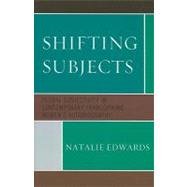Shifting Subjects Plural Subjectivity in Contemporary Francophone Women's Autobiography
, by Edwards, Natalie- ISBN: 9781611490305 | 1611490308
- Cover: Hardcover
- Copyright: 4/18/2011
There are many different ways to say 'I.' This book examines the ways in which four contemporary women writers (HZl_ne Cixous, Assia Djebar, Gis_le Halimi and Julia Kristeva) have written their autobiographical 'I' as a plural concept. These women refuse the individual 'I' of traditional autobiography by developing narrative strategies that multiply the voices in their texts. They similarly cast doubt upon current theorizations of the female self in autobiography by questioning the possibility of plural selfhood in narrative and its seemingly cathartic effects. The introduction charts theoretical understandings of the autobiographical 'I,' analyzing how early critics of autobiography defined 'I' as strictly individual, and how recent scholars have argued that autobiographical writing necessarily incorporates a variety of different 'I's. The introduction explains how the methodology of the book derives from feminist critics Fran_oise Lionnet, Sidonie Smith and Nancy K. Miller, who each interrogate voice in female autobiography. The four chapters study the work of Julia Kristeva, Gis_le Halimi, Assia Djebar and HZl_ne Cixous. Each chapter examines a text, or a series of texts, that offers a different approach to writing a plural 'I.' Kristeva writes her autobiography in two different voices, from the perspective of both 'I' and 'she'; Halimi writes hers by telling the same story in different ways and in different voices in successive volumes; Djebar writes hers as 'I' and 'we' as she weaves the voices of her female ancestors, all of whom assume the narrative voice and speak as 'I,' into her text; and Cixous writes hers from the perspectives of several different characters who witnessed her childhood. Each woman approaches autobiography as a site of catharsis for a specific trauma and each tells her story through multiple narrative voices in order to find atonement. The women's experiments with narrative voice are designed to render the female self accurately in narrative, but they simultaneously expose the difficulties inherent in writing the self plurally. Taken together, the women who form the corpus of this study move beyond critics' current understandings of textual representations of selfhood. Whereas current criticism of women's autobiography eulogizes plural subjectivity as the way in which women are able to render the self in narrative, these texts show that plural approaches to writing identity are not necessarily an adequate vehicle for self-expression. Instead, this cross-section of international writers calls for a new understanding of the inscription of female identity in narrative; not as a binary of individual versus plural selfhood, but as a cluster of categories of identity beyond 'I' and 'we.'






